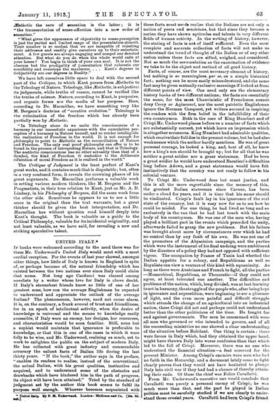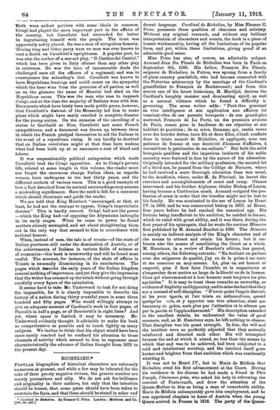UNITED ITALY. * IF books were welcomed according to the need
there was for them Mr. Underwood's United Italy would meet with a most cordial reception. For the events of last year showed, amongst other things, how little.of Italy is known in England in spite of, or perhaps because of, the natural friendship which has existed between the two nations ever since Italy could claim that name. Not long ago Carducci was classed among novelists by a writer whose love for Italy is above doubt. If Italy's staunchest friends know so little of one of her greatest sons, how can the average Englishman be expected to understand and appreciate the outlook of the average Italian P The phenomenon, however, need not cause alarm. It is, on the contrary, a frank avowal of trust and friendliness, for in an epoch of intellectual activity, when the desire of knowledge is universal and the means to knowledge easily accessible, if Italy were an enemy, her designs, her resources, and characteristics would be soon familiar. Still, none but a sophist would maintain that ignorance is preferable to knowledge, or that this is one of the cases in which it were folly to be wise, and Mr. Underwood, realising as much, set to work to enlighten the public on the subject of modern Italy. He has collected with great industry and commendable accuracy the salient facts of Italian life during the last thirty years. "If the book," the author says in the preface, "enables its readers to realise, instead of the conventional, the actual Italian, with his great qualities, instinctive and acquired, and to understand some of the obstacles and drawbacks which have hindered him in the path of progress, its object will have been attained." Tried by the standard of judgment set by the author this book seems to fulfil its purpose well enough. Whoever becomes acquainted with 17B■tod Mag. 74 F. X. liplorwood. Londoa Illethnen and Co. DO.. 64. ulta. these facts must needs realize that the Italians are not only a nation of poets and musicians, but that since they became a. nation they have shown aptitudes and talents in very different fields of human activity. in the writing of history, however.. the stating of facts is not of iteelf sufficient. Even the most complete and accurate eolleetio.n of facts will not make us understand the trend of thought of the Italian or of any other nation unless these facts are sifted, weighed, and considered. Not so much the accumulation as the examination of evidence we take to be the object and method of all good history.
Facts, of course, are the most necessary element of history, but nothing is so meaningless, per se, as a .simple historical fact ; nothing can be more easily misunderstood, and the same fact may be given mutually exclneive meanings if looked at from different points of view. One need only see the elementary history Woks of two different nations; the facts are essentially the same, for the most Chauvinistic of Frenchmen cannot deny Crecy or Agincourt, nor the most patriotic Englishman ignore the Norman Conquest, yet writers succeed in inspiring the readers with the firm belief in the infallibility of their own countrymen. Both in the oase of King Humbert and of Crispi Mr. Underwood places before us a number of facts which are substantially correct, yet which leave an impression which is altogether erroneous. King Humbert had admirable qualities,. which receive their f ull due in the present volume, but he had also weaknesses which the author hardly mentions. He was of great personal courage, he looked a king, and, best of all, he knew- how a king's son should be brought up ; but for all that he was neither a great soldier nor a great statesman. Had he been a great soldier he would have understood Baratimi's difficulties long before Adowa, and a great statesman would have felt instinctively that the country was not ready to follow in his colonial venture.
To Crispi Mr. Underwood does but scant justice, and this is all the more regrettable since the memory of this,. the greatest Italian statesman since Cavour, has been under a cloud for years, and it is time that his name should be vindicated. Crispi's fault lay in his ignorance of the real state of the country, but it is easy now for us to see how he could be misled. For one thing, lie had lived so long and so exclusively in the van that he had lost touch with the main body of his countrymen. He was one of the men who, having played a brilliant part in the events which preceded the unity, afterwards failed to grasp the new problems. But his failure was brought about more by circumstances over which he had no control than by any fault of his own. He was not one of the promoters of the Abyssinian campaign, and the parties which were the instrument of his final undoing were embittered by the disasters of a policy they hadnot opposed with sufficient vigour. The occupation by France of Tunis had whetted the Italian appetite for a _colony, and Republicans as well as Royalists can view a venture, of this kind with equanimity. As long as there were Austrians and French to fight, all the parties —Monarchical, Republican, or Theoeratic—if they could not agree, at least tolerated one another. The difficulties and problems of the nation, which, long divided, was at last learning to act in harmony, the struggle of the people who, after being kept in ignorance and superstition, were beginning to see a glimmer of light, and the even more painful and difficult struggle which attends the change of an agricultural into an industrial nation, these Crispi did not and perhaps could not understand better than the other politicians of the ,time. He fought for and against governments. The men he communed with were all men who governed or who intended to govern, and of all the succeeding ministries no one showed a clear mederstandiug of the situation before Robilant. One thing is certain; there were forces in Italy which, had they obtained the upper hand, might have thrown Italy into worse confusion than that which led to the fall of Crispi. Moreover, there was no one who understood the financial situation—a feat reierved for the present Minister. Among Crispi's enemies were men who had no faith in. the Monarchy, and a document lately come to light clearly proves that they would not have hesitated to plunge Italy into civil war if they had had a chance of thereby attain- ing their ends. Of these the chief was Felice Cavallotti.
From Mr. Underwood's narrative one would conclude that Cavallotti was purely a personal enemy of Crispi; he was 'much more than that, and the part he played in Italian polities must be carefully studied if we are clearly to under- stand those crucial* years. .0avallotti hadleenCrisprs friend. 13oth were ardent patriots with some ideals in common. 'Crispi had played the more important part in the affairs of the country, but Cavallotti had succeeded far better in ingratiating himself with the people. The trust was -apparently safely placed. He was a man of scrupulous honesty. Turing long and bitter party wars no man was ever known to -cast a doubt on Cavallotti's uprightness. A popular poet, he was also the author of a one-act play, "II Cantico dei Cantici." -which has been given in Italy oftener than any other play in existence. He was the hero of innumerable duels (he -challenged once all the officers of a regiment) and was in -consequence the schoolboy's idol. Cavallotti was known to have Republican leanings and could count on the sympathy -which the loser wins from the generous of all parties, as well -as on the glamour the name of Mazzini had shed on the Republican cause. This was the man who rose to impeach -Crispi, and at the time the majority of Italians were with him. Documents which bare lately been made public prove, however, that Cavallotti's distrust of the Monarchy led him to make plans which might have easily resulted in complete disaster for the young nation. On the occasion of the unveiling of a statue to Garibaldi at Nice, Cavallotti met some French sympathizers, and a document was drawn up between them in which the French pledged themselves to aid the Italians in the event of a republican rising. It can hardly be doubted that an Italian revolution might at that time have undone -what had been built up at so enormous a cost of blood and labour.
It was unquestionably political antagonism which made Cavallotti lead the Crispi opposition. As to Crispi's private life, related at some length in this volume, the reader must -not forget the enormous change Italian ideas, as regards women, have undergone in the last thirty years, and the different outlook of various races. This is a good example of tow a fact detached from its natural surroundings may assume a misleading significance. Here the need is felt for a comment -which should illuminate and guide the reader.
We are told that King Humbert "encouraged, or that, at least, he had not the courage to oppose, Crispi's imperialistic 'dreams." This is hardly correct. Crispi had not the power —which the King had—of opposing the Abyssinian imbroglio in its early stages. When he came to power he found matters already entangled, and set about straightening them out in the only way that seemed to him in accordance with national honour.
When, instead of men, the tale is of events—of the state of Italian provinces still under the domination of Austria, or of the achievements of Italians in various fields of science or of economics—this hook is trustworthy and will be found most -useful, The account, for instance, of the state of affairs in Trieste is unusually illuminating in its succinctness. The pages which describe the early years of the Italian kingdom conceal nothing of importance, and yet they give the impression that the writer has summed up the totals without going through carefully every figure of the calculation.
It seems bard to take Mr. Underwood to task for not doing the impossible, for it is clearly impossible to describe the history of a nation during thirty eventful years in some three hundred and fifty pages. Who would willingly attempt to give an adequate account of Oarducci's work in four pages, of Pascoli's in half a page, or of Stecchetti's in eight lines P And yet, where space is limited, it may be necessary. Mr.
Underwood evidently thought it advisable to make his book as comprehensive as possible and to touch lightly on many subjects. We incline to think that his object would have been more surely reached had he confined his attention to those channels of activity which seemed to him to represent most characteristically the advance of Italian thought from 1870 to the present day.











































 Previous page
Previous page